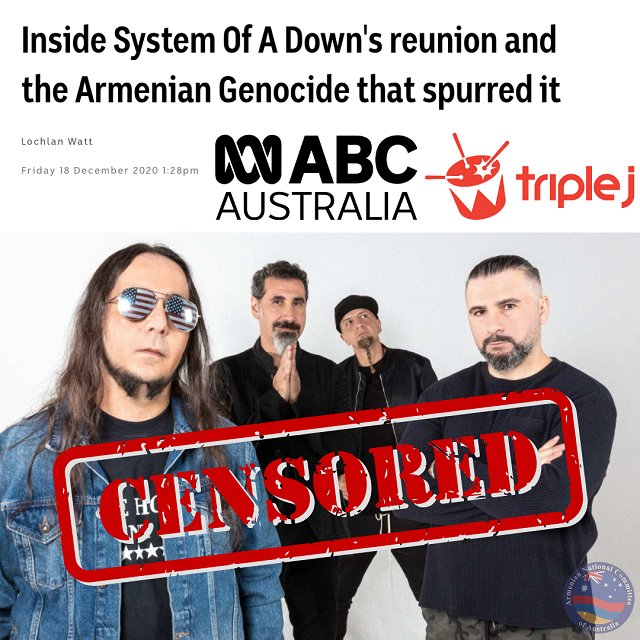SYDNEY: The Armenian National Committee of Australia (ANC-AU) has reached out to the ABC (Australian Broadcasting Corporation), asking why it removed an article titled “Inside System Of A Down’s Reunion and the Armenian Genocide That Spurred It” from its website, which featured an interview with Serj Tankian on the national broadcaster’s Triple J Radio Station.
Tankian, who is the frontman of Grammy Award-winning System of a Down, had discussed the importance of the recognition of the Republic of Artsakh to prevent a second Armenian Genocide, explaining this as the motivation for the band getting back together to produce new music after a 15-year recording hiatus.
Tankian, a New Zealand resident, was quoted on the history of the Armenian Genocide from the perspective of a grandchild of a survivor of the 1915 attempt by the Ottoman Empire to eradicate the Armenian race. He explained that what was going on in Artsakh by neo-Ottoman Azerbaijan was the motivation for the songs “Protect the Land” and “Genocidal Humanoidz”.
The interview was broadcast on Triple J’s The Racket program before Christmas, before an article featuring some of his key quotes and the Artsakh story was published on the ABC website at this link, which was subsequently taken down for reasons yet to be explained.
Read also
“The ABC is our national broadcaster and as Australian citizens of Armenian origin, we demand an explanation about what caused the removal of this important article quoting a descendant of survivors of the Armenian Genocide,” said ANC-AU Executive Director, Haig Kayserian.
“The Armenian story of genocide and the war crimes that have led to Azerbaijan’s occupation of the Republic of Artsakh deserves its place in a free Australian media, and if this wasn’t censorship, we request the ABC corrects the error and republishes the article, which is in the public interest.”
Among Tankian’s quotes in from the radio interview was a call to action to all Australians to support a petition published by the Armenian National Committee of Australia on the Australian Parliament’s website, calling for their recognition of the rights to self-determination of the Republic of Artsakh.
“In Australia right now, there’s a petition going on in parliament… to recognise Artsakh… so that in the future something like this [the war] will be less likely to occur. Go to www.anc.org.au and find the link to the petition to help,” Tankian said.
The petition closed with over 3,000 signatures.
Tankian also told Triple J: “In the 1920s, Joseph Stalin decided to give these lands [Artsakh/Nagorno-Karabakh] to Azerbaijan … these lands [Artsakh] were never really Azeri lands … Azerbaijan attacked with impunity … it was a David and Goliath situation … Not only did they [Azerbaijan] attack with missiles, bombs and modern technology, but they also attacked with propaganda… disinformation…”
He added: “It’s a difficult thing for Armenians around the world to watch yet another injustice after a hundred years happen to our people by some of the same people that are still denying that the Genocide occurred… Turkey still denies the role of their ancestors…”
“The media was just doing this false parity because the dictatorship of Azerbaijan and the dictatorship of Erdogan’s Turkey was basically saying ‘oh no, we’re not the ones who started the war, Armenia did’, even though they’re the ones who did (so) with impunity….”
“The guys from System of a Down … we were all upset about it. We all jumped on board. We made (the new songs dedicated to Artsakh awareness) happen in a miraculous amount of time…” Tankian added.
The complete article, removed from the ABC website is pasted below, and the radio interview can be listened to in full by clicking here.





















































